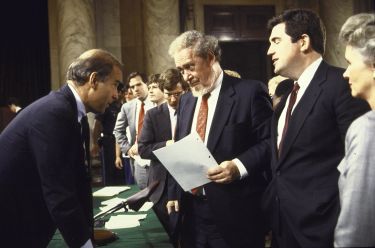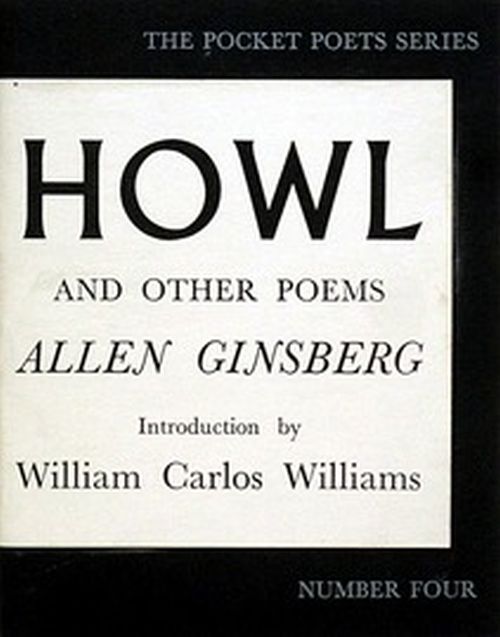Among the Supremely PC
From The American SpectatorEllen DeGeneres opened this year’s Oscar broadcast with a joke about the two possible outcomes of the nearly four hours of self- congratulation to come — hours that, as she could not have known at the time, were to culminate in Matthew McConaughey’s bizarre acceptance speech as Best Actor in which he claimed that his hero has always been himself in ten years. It occurred to me that he only differed from most of those present by being more honest. And by adding “in ten years.” Miss DeGeneres was also embarrassingly honest when she joked that either 12 Years a Slave would win the Award as Best Picture or, alternatively, “you’re all racists.” She wasn’t being all that daring, since she must have known she could count on the Academy to come through — as indeed it did — for Steve McQueen’s already much-begarlanded film about a free black man from New York, kidnaped and sold into slavery in 1841.
Without the political culture of Hollywood, that might have sounded like a great idea for a movie. With it, and apart from a fine performance by Chiwetel Ejiofor as the temporary slave Solomon Northup, it turned out to be just one more excuse for self-congratulation, an opportunity for the beautiful people to get together and chorus: “See? We’re not racists.” To those of us outside that charmed circle of the supremely politically correct, it looks as if they are setting a pretty low bar for themselves, as indeed they are. But we have to understand — as I did not when I reviewed 12 Years a Slave for The American Spectator’s website — that politics for them is not politics as we understand it, or as it has been traditionally understood. For them, politics is a movie, as well as the occasion for proclaiming a tribal loyalty.
You can tell this by watching, if you can bear it, the always unreal movies and TV shows about politics — House of Cards is a good recent example — produced by the American entertainment industry. Hollywood sees politics as movie-makers and other conspiracy theorists do. Or as a communist does, which may be one reason why communism was once so much more popular there than it was in the rest of the country. For such people, democratic politics is no more than a disguise for the politicians’ corruption and violence and their common cause with exploiters and oppressors of the people. In my review, I made the mistake of thinking that Mr McQueen and company might have been interested in creating something more like an authentic portrait of the ante-bellum South than in fact they had created as the backdrop to their hero’s experiences and suggested — rather flippantly, I admit — that a happy slave or a kind master here or there could only have added to our sense of verisimilitude and thus to the poignancy of the film’s account of Mr Northup’s doubtless very real sufferings.
At the time nobody seemed to notice. Prepare yourself for a shock, dear reader, but very little of what appears in the pages of The American Spectator or on its website ever penetrates the media or culture at large. We read them; they don’t read us. But after Slave won the Academy Award, someone from the culturally high-class side of the tracks spotted my review and ballyhooed it on Twitter as an example of the moronic racism of the lumpen right. Look, everyone! This idiot is saying that the slaves were happy. Among the numerous 140-character shafts directed at me there were several whose authors appeared to consider it the most devastating kind of put-down to suggest as an apt analogy an implied complaint on my part that there were also no happy Jews in Schindler’s List or some other movie-ization of the Holocaust.
But of course my point was precisely that slavery was not the Holocaust. Evil as it was, its purpose was not the torture and murder of slaves but the exploitation of their labor. It serves no purpose but that of propaganda to pretend otherwise, as 12 Years a Slave does almost everywhere. When the only sin is racism, then racism becomes uniquely sinful, every instance of it, real or imagined, a proto-Holocaust. Anyone suggesting that there could be any moral matter that transcends racial questions obviously must belong to the racialist conspiracy that, to the anti-racist élite is everywhere among those who don’t think just as they do. For the same reason, those most closely attuned to Hollywood’s political views are always the first to attribute any criticism of President Obama from the right (though not from the left) to racism.
Once this is understood, it is easy to see how, for some people, movie criticism becomes a high-stakes enterprise, a denial or a confirmation of their very identity as decent people. Having denied old-fashioned notions of decency in practically every other respect, what else do they have to be decent about except race? Thus, too, Best Actress Cate Blanchett felt she had obliquely to defend Woody Allen from the stage during her acceptance that Oscar night, to half-hearted applause from the audience. Giving Mr Allen the benefit of the doubt about highly publicized allegations by his adopted daughter is one thing, but reaffirming his status as an admired member of the Hollywood “community,” as the lovely Miss Blanchett chose to do, suggested that she and her fellow stars saw him as a martyr to the small-minded prejudices of those whose traditional notions of sexual morality very probably went hand in hand with racism.
At any rate, both kinds of prejudice must be regarded as tell-tale markers of exclusion from the Elect, just as advocacy of and monetary contributions to progressive political causes are indications of inclusion in it — or an associate membership for those who don’t otherwise qualify as celebrities. The movies and TV have always been, among other things, manufactories of fame, but increasingly that’s all they are. “Reality TV” — they named it for the part they left out — could not exist otherwise, or if it had to entertain in the traditional way. Celebrities have, of course, been around for a long time, but they used to have to earn their fame by some means more strenuous or morally exacting than looking good at five times life size. Now they don’t even need to do that, so long as they can show by adopting fashionable attitudes that they belong to the community of celebrity.
Celebrity-world has so far become the norm in movies and media that we increasingly see the whole of human history refracted through its lens — including biblical history. Paramount’s disclaimer about its blockbuster Noah — “While artistic license has been taken, we believe that this film is true to the essence, values, and integrity of a story that is a cornerstone of faith for millions of people worldwide” — is a sure indication that it is not true to any of these things, but instead an environmentalist fantasy about an angry “Creator” destroying mankind for having despoiled his “beautiful” creation. Noah (Russell Crowe) is said to be the last of the gentle, vegetarian race descended from Seth, while the mass of mankind, the descendants of Cain, are brutal, warlike builders of “industrial” civilization and thus must be drowned. It may not have anything to do with the Bible — the rock monsters known as “Watchers” who help Noah build the Ark are a particularly movie-ish touch — but it is a perfect fable for the Beautiful People who are likewise sure that they stand apart from the rest of mankind and deserve to be spared from the general doom.
Christopher Spencer’s Son of God, adapted as a feature film from the History Channel’s mini-series The Bible, though truer to biblical accounts, can’t imagine the Savior of mankind, played by Diogo Morgado, as anything other than a rock star avant la lettre — infinitely compassionate and infinitely suffering but never in the slightest degree inclined to be “judgmental about others. Or not about people like us, anyway. And all that stuff in the Bible about the burning lake of fire or those for whom it would be better that they should be dropped into the sea with a millstone around their necks? Not only do we hear nothing about them from the lips of this Jesus, but we can’t imagine his saying anything so unemollient. The only sinners here are Romans (imperialists) and Pharisees (hypocrites). They’ll get their comeuppance in due course, but nothing much appears to be expected of the rest of us. The whole of the Sermon on the Mount is condensed into a sharp rebuke to Peter (Darwin Shaw) to “turn the other cheek” when he gets too rambunctious in defense of his Lord. This is a Jesus for the celebrity culture, a Jesus who, on first meeting Peter, tells him “We are going to change the world.” In fact, they have already changed it. But not for the better.
Discover more from James Bowman
Subscribe to get the latest posts to your email.







